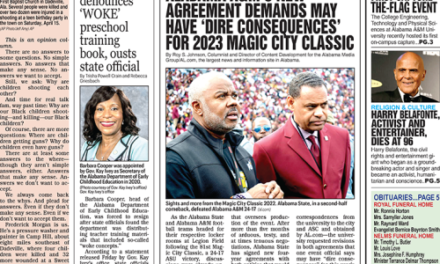
By DaQuan Lawrence,
AFRO International Writer,
DLawrence@afro.com
In the growing international virtual economy, Black businesses that operate digitally and in multiple countries are critical for members of the African diaspora.
True Culture University (TCU) is a unique example of a new Black-owned international startup that seeks to connect Black collegiate students around the world in the spirit of Pan-Africanism.
For National Black Business Month the AFRO spoke with Miles Henderson, the founder and CEO of TCU, who is actively working on multiple continents to build the international startup. Originally from Little Rock, Ark., Henderson has set up operations in East Africa and Washington D.C.
“Our headquarters are in Addis Ababa, so I go back and forth between the DMV (D.C., Maryland and Virginia) area and East Africa,” Henderson told AFRO.
TCU is a global Pan-African collegiate platform focused on promoting the development of the future leaders of the Black world and establishing connections for students to communicate and work together. The business provides opportunities for Black students to gain practical skills that allow them to operationalize Pan-Africanism in their career endeavors, instead of merely discussing and referencing the topic as an ideology.
“In the digital age, there’s no reason why we shouldn’t be able to connect Black students from all over the world. Also, not only students, but all Black people,” Henderson said.
Despite being conceived in Ethiopia, a nation that has been engaged in armed conflicts for decades, TCU is the leading Pan-African collegiate organization within the state.
Pan-Africanism is the belief that all African descendants share a common history, struggle and destiny. Efforts that support cultural, social, political and economic self-reliance and the development of Africa and its diaspora, were popularized by leading Black activists and scholars in the 20th century.
Well-known Pan-Africanists include Marcus Garvey, Malcolm X, Kwame Nkrumah, Constance Cummings-John, Claudia Jones, Ella Jo Baker, Frantz Fanon and several others.
TCU exists for students in the diaspora to take action to improve the global Black world in the 21st century and beyond. The organization provides infrastructure for students to change reality in the interests of Black people and considers Black youth as the architects of Black futures.
Students can participate and join TCU by chartering a chapter at their university or through its new mobile application.
“We’re excited about our upcoming mobile app. Imagine a social media app for Black college students all over the world. It combines the best of Twitter (now known as “X”) with Medium and focuses on student journalism, so students can showcase what’s happening on their campus,” Henderson said.
TCU plans to expand to every region in Ethiopia, and currently has chapters or a presence at four Ethiopian colleges including Addis Ababa University, Bahir Dar University, Debre Berhan University, and University of Gondar, and six international colleges – Jomo Kenyatta University in Kenya, Cheikh Anta Diop University in Senegal, the Steve Biko Institute in Brazil. There are also chapters at Howard University in Washington, D.C. and at the the University of Ghana and Oxford University in the United Kingdom.
Since its initial inception in 2016, TCU has published content from 50 universities. In the future, the organization aims to provide avenues for Black youth in the U.S. and across Africa to communicate with each other through the TCU app, which is in the beta testing stage of development.
“Our app is aiming to act as a piece of digital infrastructure that allows connectivity and interaction,” Henderson said.
“We’re focusing on students to provide the opportunities and channels for future leaders, engineers, artists, political activists and others to have a global network to communicate with each other and understand the news of what’s going on in the world,” he continued.
What makes TCU unique, in addition to its operational strategy, is the Pan-African aim and intent to develop the youth in the African diaspora. Designed with a track system in mind, the institution offers students opportunities to gain skills and develop their career interests in art, news, tech, events, business and education.
Students interested in business can design and sell shirts on the platform. Those working in agricultural markets like the coffee industry, can sell coffee in their immediate communities. In the tech track, students engage in an annual pitch competition, submit innovation projects and they gain access to incubation and accelerator programs.
Within the news track, students are creating a global Black campus news network, while in TCU’s art track, students use the newest cutting-edge tools like artificial intelligence and generative AI to create images and short films based on science fiction and Afro futuristic versions of reality.
“We promote an understanding of how they should be thinking not only about themselves but about the strategic moves of the Black world, as they develop into the leaders of the future,” Henderson said, in response to how TCU can help Black youth.
TCU is currently open to college students and plans to add a pipeline for high school students in the future. Local and international businesses, nonprofits, and the public sector can partner with or support TCU by participating in its initiatives and via online donations. Throughout the 21st century, the organization seeks to lead student-propelled Pan-African engagement all over the world.
“We don’t want people to think Pan-Africanism must be some strict formula. Instead, we want anyone who engages with TCU to realize that we are the creators of Pan-Africanism,” Henderson said. “We are the creators of what global black unity looks like.”
For inquiries about True Culture University, please visit: www.tcu-portal.com, or contact the TCU Headquarters at: truecultureuniversity@gmail.com.
The post AFRO inside look: how True Culture University connects college students and entrepreneurs around the world appeared first on AFRO American Newspapers .











